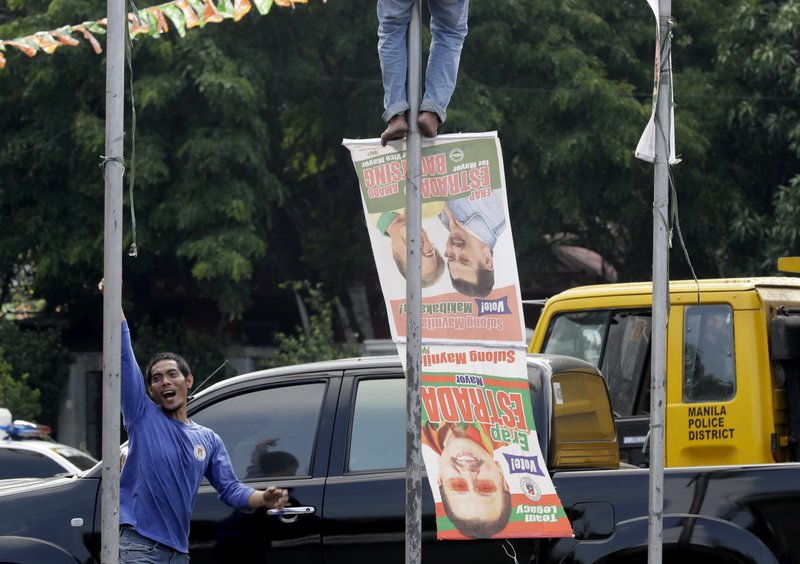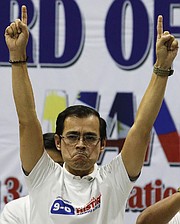MANILA, Philippines -- President Rodrigo Duterte's allies had overwhelming leads in elections for the Philippine Senate, one of the opposition's last bulwarks against a populist leader accused of human-rights violations.
Preliminary results comprising 94% of returns from Monday's midterm elections showed at least eight candidates endorsed by Duterte were leading in races for 12 seats in the 24-member Senate. Official results from the Commission on Elections are expected to be declared in about a week.
Those leading include Duterte's former national police chief, Ronald dela Rosa, who enforced the president's crackdown on illegal drugs, a campaign that left thousands of suspects dead and drew international condemnation.
Monday's vote is seen as a gauge of public support for Duterte, who is midway through the single six-year term Philippine presidents are allowed under the constitution. His anti-drug crackdown, unorthodox leadership style and contentious embrace of China have been the hallmarks of his presidency.
Duterte's three children were also expected to win races for mayor, vice mayor and a congressional seat representing their southern home region of Davao city.
"The overwhelming majority of the electorate have responded to the call of the president to support those whom he said would help pass laws supportive of his goal to uplift the masses of our people and give them comfortable lives," presidential spokesman Salvador Panelo said in a news conference.
Manila-based analyst Ronald Holmes, however, said that except for dela Rosa and Duterte's longtime aide, Bong Go, who entered politics for the first time without their own established bases of support, other leading administration senatorial contenders earned votes based on their own political track records.
The flipside of Duterte's perceived endorsement strength was the weakness of the opposition ticket and its campaign, said Holmes, who heads Pulse Asia, an independent pollster that predicted the dominance of Duterte's senatorial bets.
Another analyst, Richard Heydarian, said many Filipinos seem more open to authoritarianism due to failures of past liberal leaders from long-established political clans. Such a mindset has helped the family of the late dictator Ferdinand Marcos make a political comeback, the latest through the senatorial bid of one of his daughters, Imee Marcos, who was endorsed by Duterte and whose vote tally in unofficial results indicated a victory.
Duterte, who has shown little tolerance for critics, especially those who question his anti-drug campaign, aimed for stronger leverage in the traditionally more independent Senate to bolster his legislative agenda.
That includes the return of the death penalty, lowering the age for criminal liability below the current 15, and revising the country's 1987 constitution primarily to allow a shift to a federal form of government, a proposal some critics fear may be a cover to remove term limits.
Last year, opposition senators moved to block proposed bills they feared would undermine civil liberties.
The handful of incumbent opposition senators whose seats were not up for election could potentially get backing from leading independent aspirants to veto Duterte's emerging majority in the upper chamber. At least seven senators are needed to block any proposal by Duterte's camp to revise the constitution, which was passed with anti-dictatorial safeguards in 1987, a year after Marcos was ousted by an army-backed "people power" revolt.
"While we expect dissent to continue, we hope that that same be demonstrated with fairness and within the bounds of the law, as well as with deference to the leaders duly chosen by the electorate," Panelo said.
Aside from the drug killings, Duterte has also been protested and criticized for his language and for what nationalists say is a policy of appeasement toward China that may undermine Philippine territorial claims in the South China Sea.
Opposition aspirants consider the Senate the last bastion of checks and balances given the solid dominance of Duterte's loyalists in the lower House of Representatives.
Voters in Monday's elections made their choices for 18,000 congressional and local posts, including 81 governors, 1,634 mayors and more than 13,500 city and town councilors in 81 provinces. In the Manila metropolis, younger mayoral candidates defeated three political leaders, including former President and Manila Mayor Joseph Estrada, who lost to Isko Moreno Domagoso, also a former movie actor.
The elections were relatively untroubled, despite pockets of violence in southern Mindanao region, which is under martial law as government forces hunt down militants and communist insurgents linked to the Islamic State extremist group.
A Section on 05/15/2019

